Sandra Beasley's Blog, page 3
August 19, 2019
August, August

I wasn't expecting this to be the type of summer that got one big end-of-season post, but here we are. Even if one experiences a temporarily happy moment these days, coming to social media--and a shared news cycle--tells us that things are very much awry in the world, and in particular in the United States. How do we use these spaces we've created? For affirmation? For protest? For the quotidian? We struggle, in the moment, whether we should use them at all. Sometimes it is all we can do to shut up, and to take in the changing colors of the water around us.
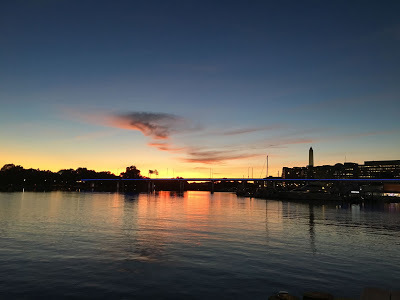
This was a small-scale summer, which I needed after beginning the year in Ireland. I traveled to Tampa for teaching; my husband and I did an overnight getaway to Charlottesville, stopping off to visit Virginia Center for Creative Arts in tandem; and I just returned from running a few seminars in Delaware, as part of the Lewes Creative Writers' Conference. Otherwise I stayed very much anchored to home.
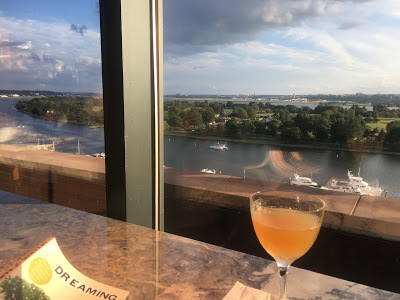
I've been working to forge my own connection with the Wharf, a rather shiny and megalomaniacal new complex mere blocks from where we live. The Wharf brings a lot of commercial energy to the neighborhood, but that's not the same as calibrating to the neighborhood's needs or price point. I'm slowly figuring out the best spot to sip a cup of coffee during a meeting (Velo), or to sip a single fancy cocktail while alternating between reading and taking in the view (12 Stories), the best $10 lunch (Grazie Grazie), and the place to snag a free chair right by the water (I'm not telling you). Officina's market has good deals on house-made sausages, and big loaves of fresh sourdough and ciabatta. We cooked a meal using filet from the fish market--posole verde with cod--and that's the start of something, even if I did add so many spicy chili peppers that our guests hiccuped.
An incredibly talented poet happened to be temporarily in the neighborhood, too, and that proved to be another anchoring joy of the summer. We had hijinks, as one should.
Many of my worries about what might happen in going to Ireland did not come true--they were phantoms, nothing more--but one did come true: Whisky, our beloved cat, lost weight. She is not a cat who could afford to lose weight. (Look at those jutting hip bones in the photo below. Good lord.) She missed us, despite three superb cat-sitters. I've been trying to bring her back from the brink one bite of food at a time, which entails many pets.
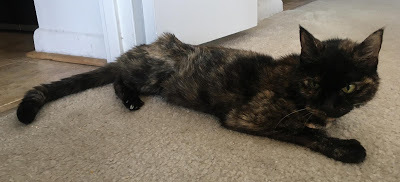
I've been planting things. That is partially a literal observation--I've redone all the succulents inside the house, and I've flipped many of the patio containers that get challenged by the brightest of suns and the strongest of winds and, on the 9th floor, a lack of natural pollinators. They are hanging in thanks to daily watering.
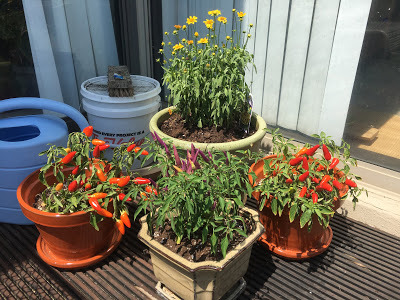
The planting has been going on figuratively, too. I am leaving the summer with a nonfiction manuscript of lyric essays in hand, as the wheels turn on the next poetry collection. The fall is teeming with teaching responsibilities. For the University of Tampa: thee nonfiction students, two in their thesis semester. For places outside the academy: a three-session arc at Politics and Prose (poetry), and a four-week online class for 24 Pearl Street (nonfiction). For American University: my usual undergraduate session of Writers in Print / in Person, and teaching the graduate poetry workshop--a classroom space I first entered as an MFA student, 17 years ago. Bringing some apartment life into my campus office felt like a good idea, so I got a baby-Groot inspired holder for one of our air plants.
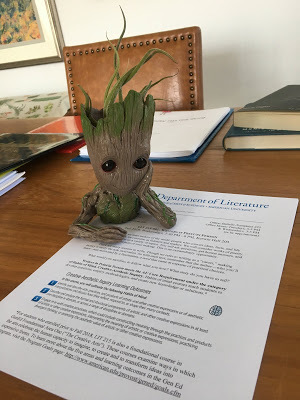
As I was working on this post, I found out that a friend died. He'd been ill for a couple of months, an inexplicable interruption to a vibrant (and much loved) life down in Mississippi. If there was a cool thing going on in town, Ron would be there. That was how you knew it was where you wanted to be. His generosity came so easy to him, so natural--"Got U a chair if U wants," says an old text message, "I'm to right of stage"--and though I'm tempted, once again this summer, to fall into silence out of grief...I know he wants us out here doing the things. All the things. Live a life that makes people miss you when you're gone.
Published on August 19, 2019 13:37
May 21, 2019
Trips, Journeys, Voyages - More from Cork
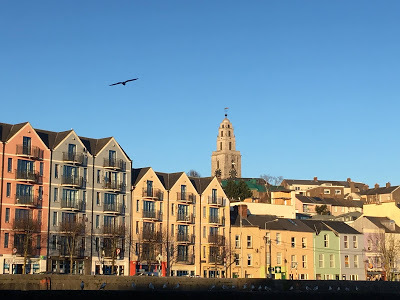
I've been back from Ireland for almost a month. There have been so many welcomes back--buying coneflowers and basil to plant on the balcony, cooking spicy dinners, a few long phone conversations, petting the kitty x 10, sifting through my books on their shelves, watching the American University MFA students give their graduating readings, even a bottle of Maker's Mark (cask strength!) as an unexpected gesture of Southern-Foodways-inspired generosity. There is good to being home.
Yet Ireland is still echoing through my head; so many shades of gray, blue, and green.
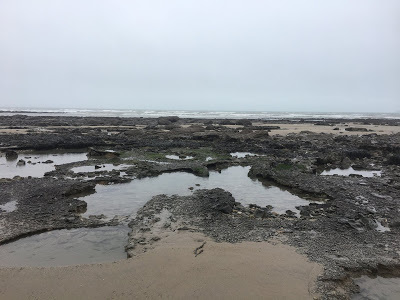
Venturing to the seashore in Garyvoe, and up to the edge of the cliff all in Ballycotton, with my student on an overcast day--before we took shelter at the Jameson's distillery.
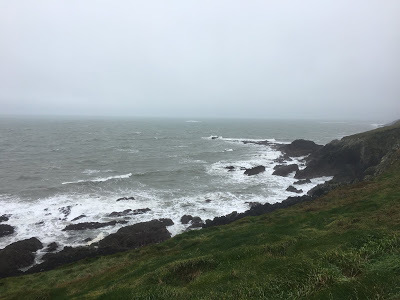
The countryside is dotted by yellow gorse, beautiful but thorny (and invasive). Another student showed me that the crushed flowers smell uncannily like coconut.
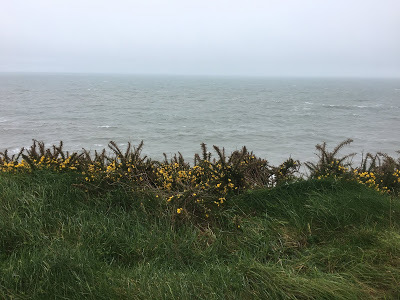
When my parents came to visit, we braved the roads in their rented car to Clonakilty and beyond to see the stones of Drombeg. We pulled up to a silent, misty field.
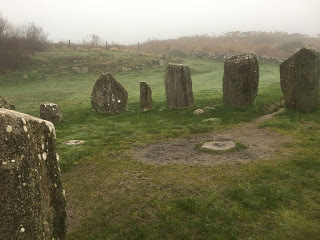
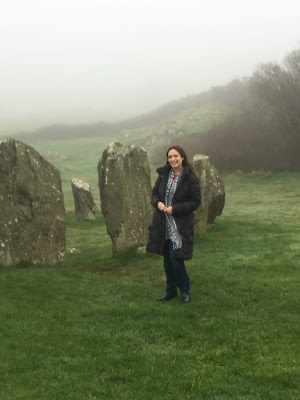
A small bit of signage helped us understand what we were seeing: the circle of seventeen stones oriented toward the midwinter solstice's setting sun, with a center where an urn with cremated bones had been recovered, dated to somewhere between 153 BC and 127 AD. Nearby, the remains of two small huts, plus a hearth and trough where water would have been heated by dropping in stones heated by fire.
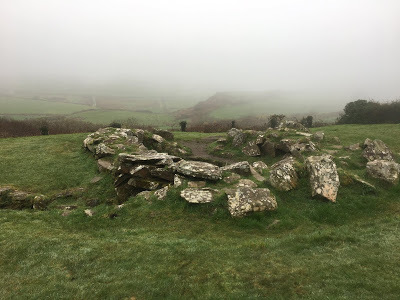
A friend drove me to Kinsale by way of several small towns, including a stop at the ruins of Timoleague Abbey. The weather was comically rainy--great gusts pushing us as we traipsed through the soaked courtyards.
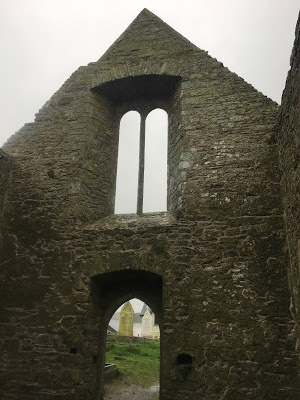
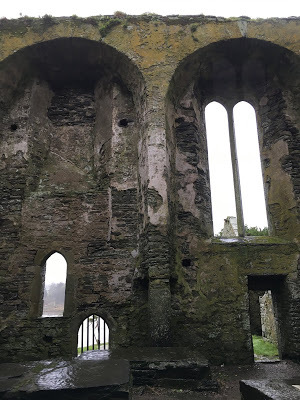
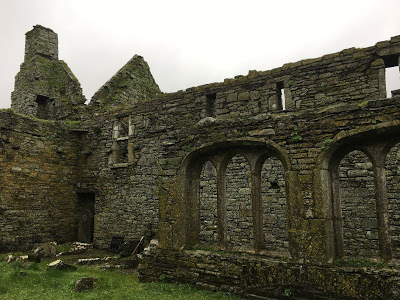
By the time we got to Kinsale, the weather (and the water) was a crystalline blue. We circled the edges of the Charles Fort.
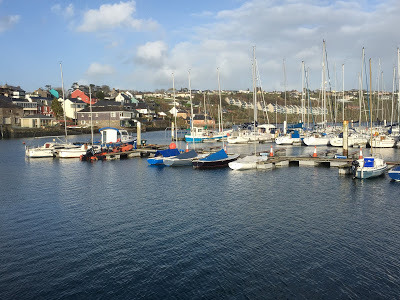
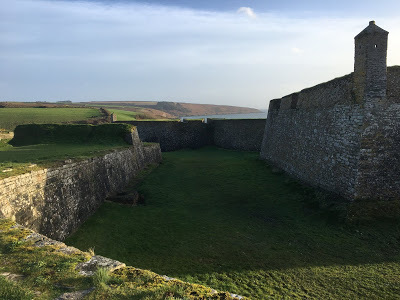
A few weeks later, my husband and I caught the bus to Kinsale, going into the fort for an hour to explore before venturing further out to the water's edge.
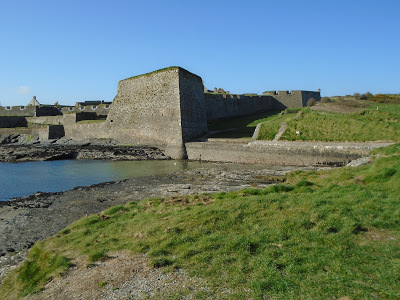
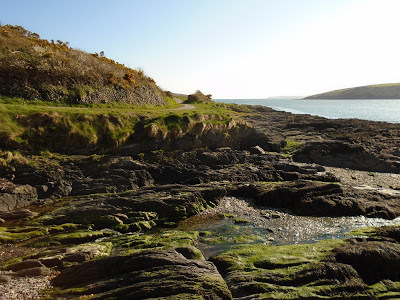
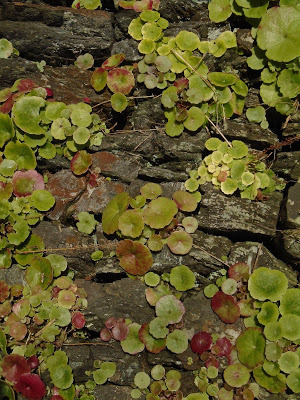
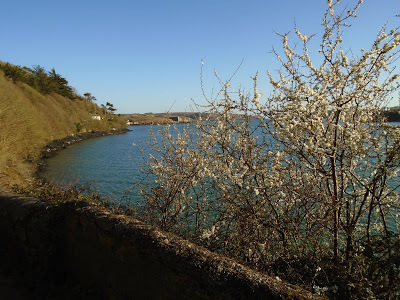
From the Scilly Walk back to downtown, you can see the remains of the older James Fort--occupied by Spanish forces during the 1601 siege--on the far shore.
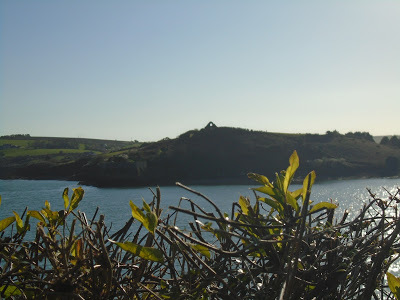
One of my students took us to her family's place by the shore, just outside the town of Castletownbere in the Beara Peninsula. The forecast had predicted two straight days of rain. The fates were kind and the weather cold, but clear. I come from a family of seashell-hunters and it felt right that for the first time in Ireland, I found them here.
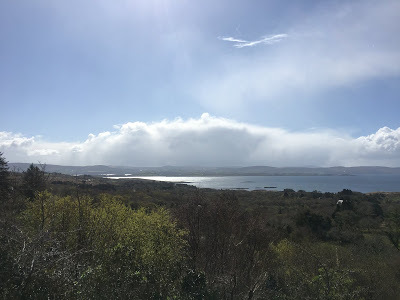
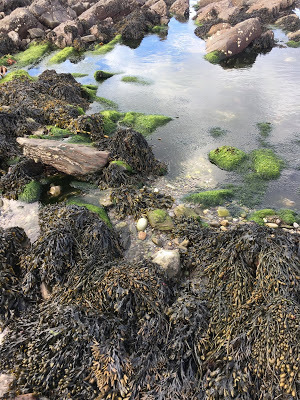
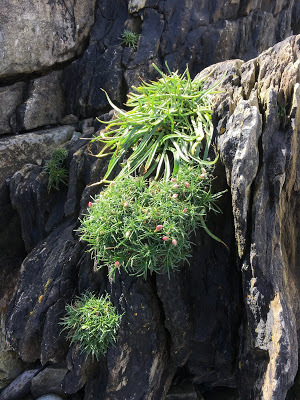
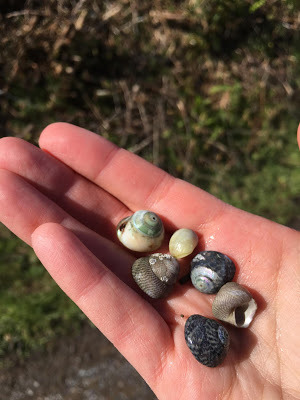
The schedule was simply: stop for whatever beckons before the sun sets. That began with a walk along sea cliffs. My student knew the right gate to open.
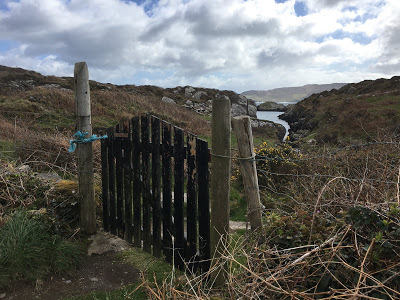
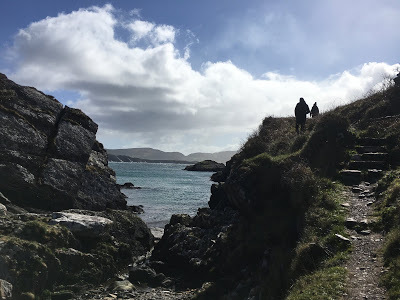
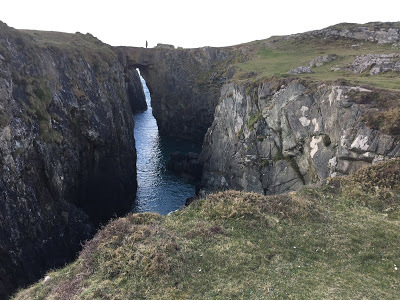
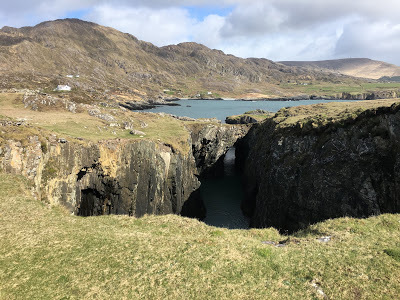
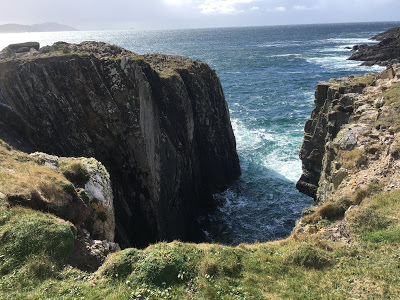
We made what should have been a quick stop to see the (purported) shrine to the children of Lir, only to be gently waylaid by a pack of horses that had gotten loose.
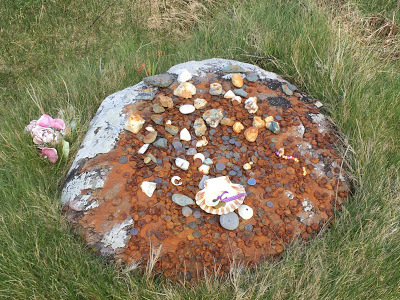
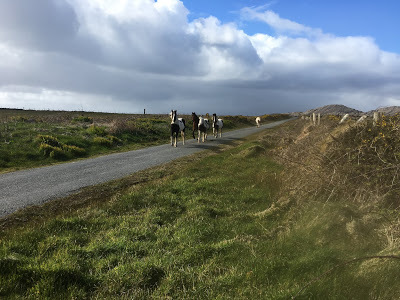
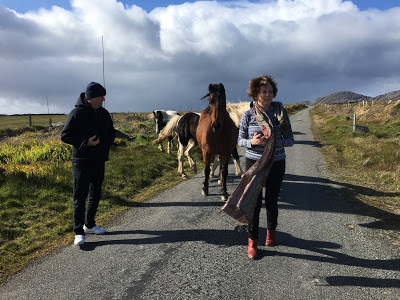
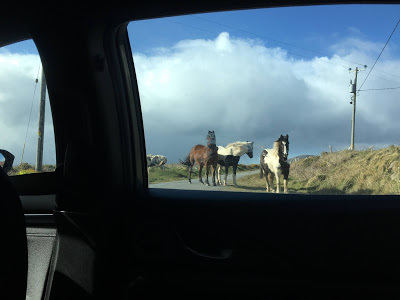
Ireland's only cable car runs to Dursey Island. The door is secured with a latch. Emergency supplies consist of a two-way radio and a bottle of holy water.
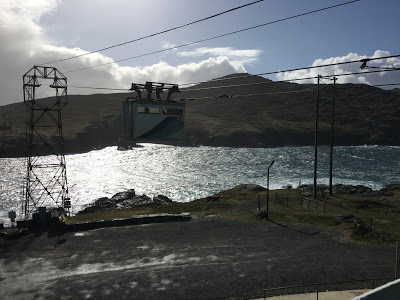
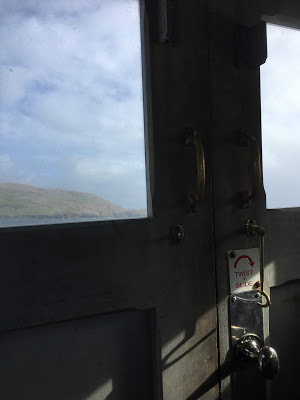
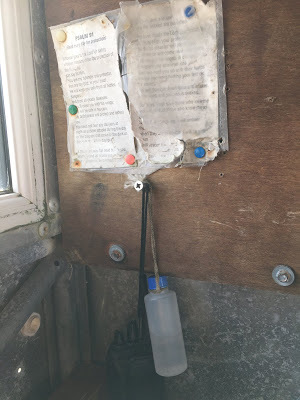
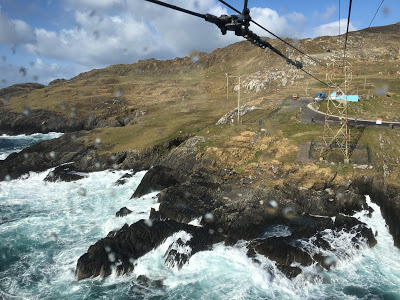
Making our way back for the night, we saw a sign for a ring fort--a place even my student had not yet visited--and decided to check it out. Wherever there's a green ladder, you have permission to go. Just don't bother the sheep.
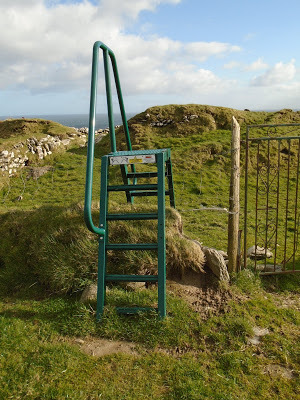
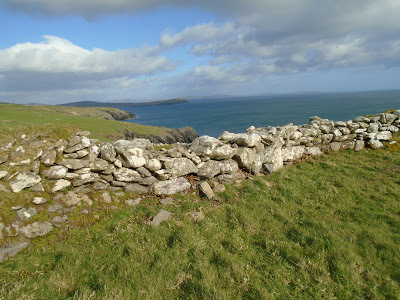
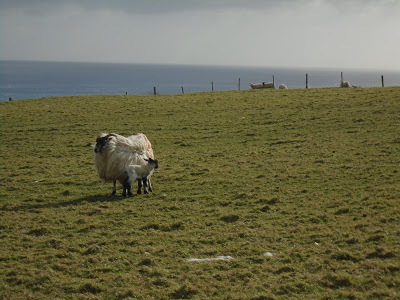
A new day, a new gate to open--this time to see a stone with an ogham inscription, a primitive form of Irish writing.
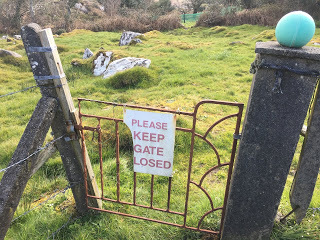
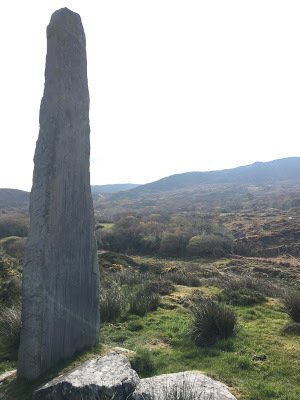
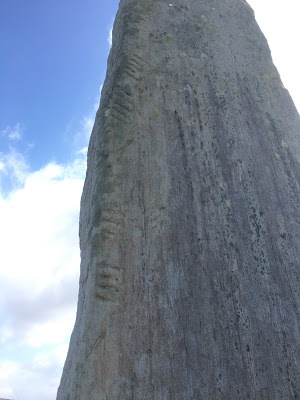
Our host wanted to show us Gleninchaquin lake and the Uragh stone circle, which crossed us into County Kerry. We got to the stone circle and found it overtaken by sun-lazy sheep. Slowly, surely, we negotiated with the locals for a closer look.
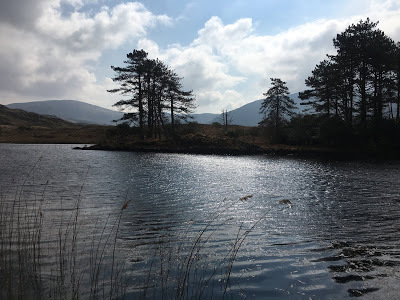
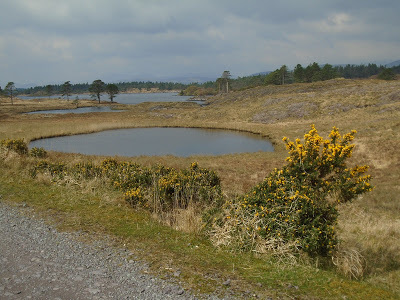
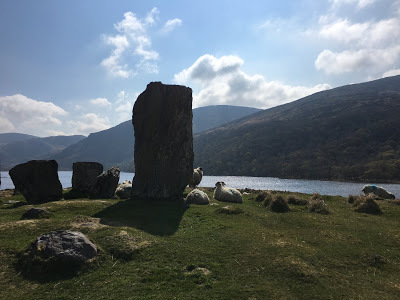
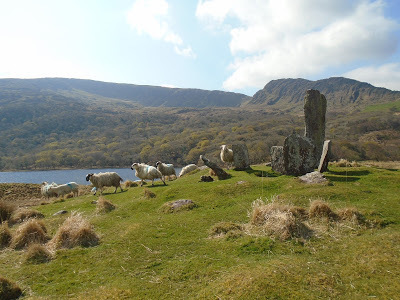
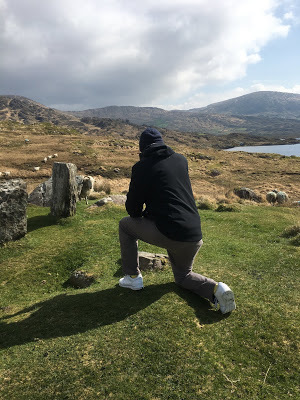
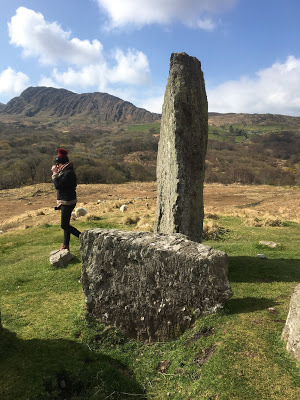
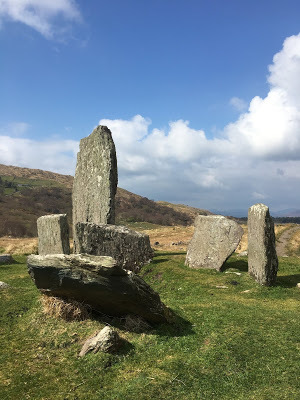
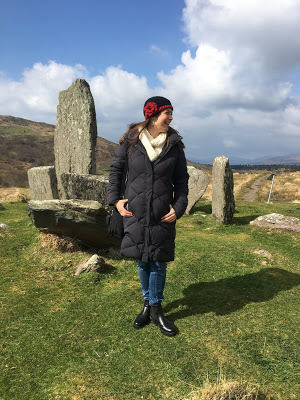
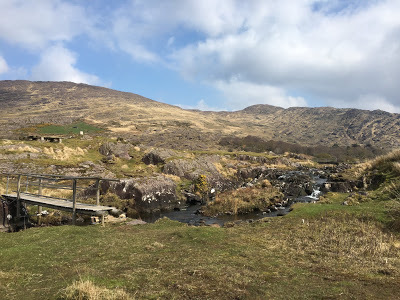
A week later, when another poet offered to take us anywhere we wanted to go by car, I said: "I'd like to see castles." And castles he did provide: three in one day, with a bonus spotting of a sheela-na-gig when we stopped off in the walled town of Fethard. The enclosure of Fethard probably dates to the 14th century. These female figures, with their exaggerated sexuality, date from well before that--appropriated and re-mounted into the walls. In 1990, when one disappeared from the town, the tabloid headline read "Rude Nude Stolen."
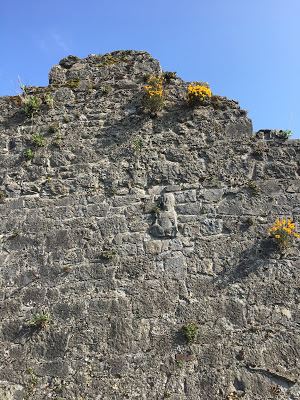
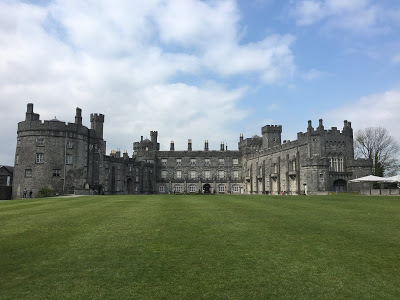
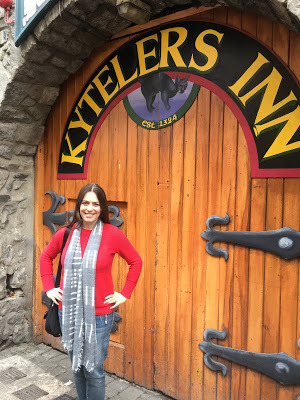
Kilkenny had the castle I'd heard about, and it probably pained my Tipperary-born host to be so set on seeing it. He patiently endured my misguided pursuits of cream ale on draft and hurling tchotchkes, steering me instead towards a a perfectly good tavern whose owner, Alice Kyteker, was convicted of witchcraft in 1324 after her husbands kept dying. Fortunately, she escaped to England before she could be burned.
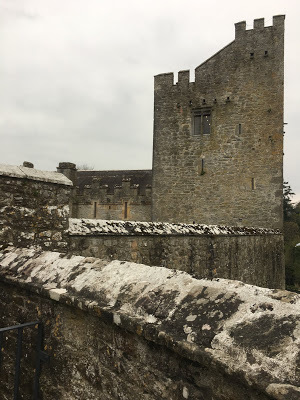
The Cahir castle was the best, the surprise of the day--a beautifully preserved example of 13th-15th century defensive design. The rooms inside were stark, with stairs of varying heights designed to trip up invaders.
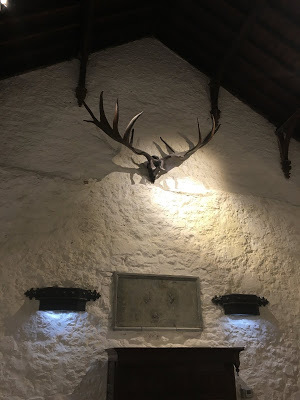
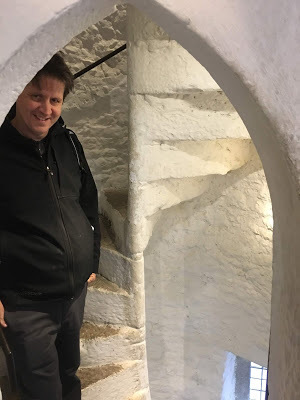
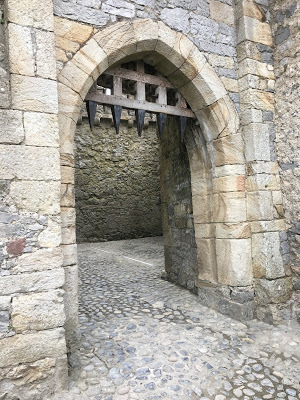
The portcullis is the only one in Ireland still fully operational. You've probably seen it come snapping down in a movie. A few days earlier, shooting had wrapped on scenes for The Green Knight, a retelling of the Sir Gawain myth due out in 2020.
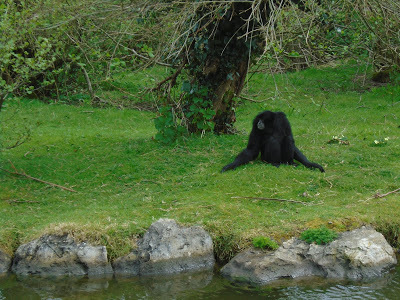
We knew we wanted to try taking the train, and Fota Wildlife Park was an easy twenty-minute ride from the city centre. I was stunned by the extent to which the animals can roam free, and the size and the healthiness of their populations.
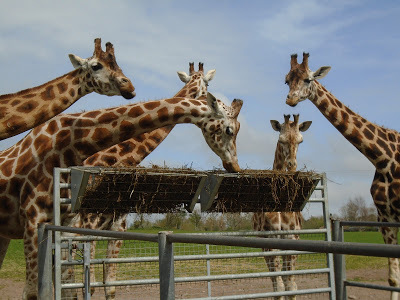
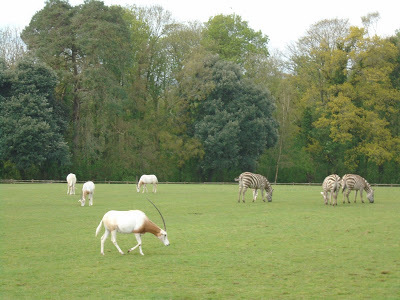
From there, we went on to Cobh. Don't bother, a few told us, but there's something special about this hilly, slightly dingy port city that has been a jumping-off point for so much history. We had a pint at Connie Doolan's and heard the story of how the owner had acquired the bar, after the previous owner had won it in a contest run by Guinness. I found myself in the seat frequented by "mailbag baby" Millvina Dean, who for years had been the last living survivor of the sinking of the Titanic.
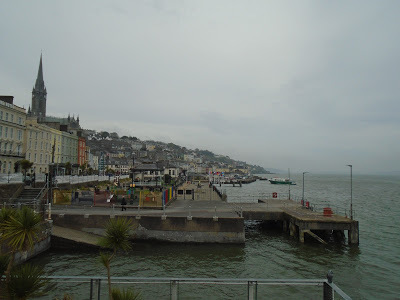
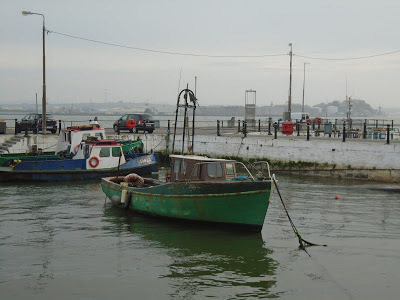
My student suggested one last road trip, on the heels of our last mentoring session at Alchemy Coffee. Gougane Barra sounded modest enough--a church in a valley--but the actual site of where Saint Finnbarr took shelter, before going on to become the first Bishop of Cork, was unexpectedly moving. This lake marks the source of the river Lee.
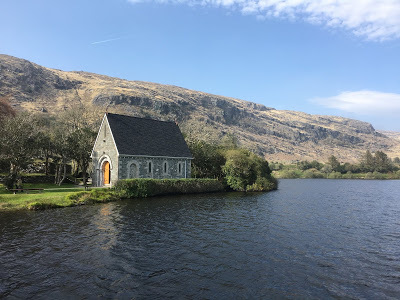
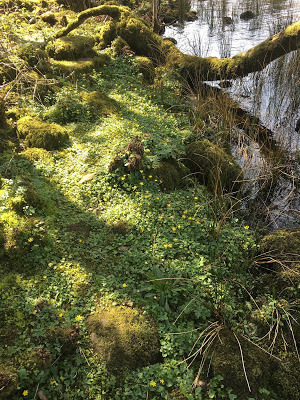
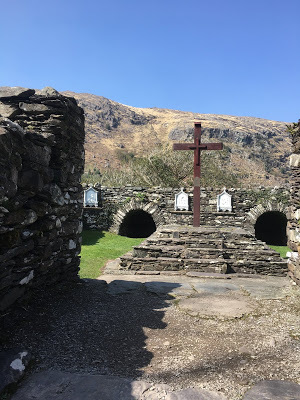
We took one of the forest walks. Except it turned out to not be an official "forest walk" at all, but straight-up hike through private farmland--the part where we climbed a ladder should have been our tip-off. Soon the church was just a dot far below.
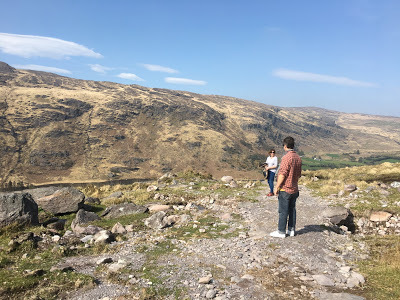
My first poetry teacher, Rose MacMurray, titled her book Trips, Journeys, Voyages. These are snapshots from the trips, a day or two at a time. The journey took me from D.C. to Cork and back, and it's a journey that (with any grace of luck) I'll be making again. The last time I felt this strongly about a place was Mississippi, and I wouldn't mind if they both turn out to be lifelong affiliations. The voyage is a larger one, of trying to figure out the writer I can be in this world. No map, but with the good fortune of the wind at my back, and these memories still fresh in my heart.
Published on May 21, 2019 10:42
April 30, 2019
Save the .4%! (Or: The Autonomy of the DC Commission on the Arts and Humanities Is Under Attack. Artist Grants Are Being Targeted. Here's What You Need to Know.)
Chairman Phil Mendelson
DC Council of the District of Columbia
Dear Chairman Mendelson,
I am writing to express grave concern over the status of arts funding in the District of Columbia in the proposed Fiscal Year 2020 budget put forward by Mayor Bowser’s office and now being considered by the Council.
The specifics of the Commission on the Arts and Humanities budget table (BX0) are nested within“2020 Economic Development and Regulation.” This structure recognizes the symbiotic relationship between the arts and the general economy. Robust arts activity is a key contributor to our city’s finances. But that revenue will continue only if artists are given funding to create a vibrant, inclusive, multi-disciplinary scene that attracts audiences. Support for arts is crucial to the preeminence of Washington, D.C., in America’s cultural landscape.
For the Fiscal Year 2019, as a result of focused advocacy and initiative, Washington, D.C., dedicated .4% of its sales tax revenue to funding for the arts. This allocation was an important and logical gesture recognizing that local arts—galleries and exhibitions, dance, theater, and music performances, literary festivals, and other events—are a principle draw for retail activity in terms of tickets, merchandise, and tandem items such as food and drink. The Mayor’s proposal eliminates that hard-earned allocation, proposing a set disbursement instead.
In the short term, the amounts might be comparable, but in the long term this severs an organic alignment between commercial growth and arts funding. The consequence is painfully ironic for artists who are part of a neighborhood that picks up business as a “hotspot” for arts tourism, due to their labors, only to be priced out of residency. When funding amounts stay static while the costs of living continue to rise precipitously, practicing artists are forced out of the city. Restoring the dedicated sales tax funding is both a practical and proportionate decision.
Another point of concern is the “DC Cultural Plan,” which includes an “Innovation and Entrepreneurship Loan Fund.” Individual artists who might have previously received grants will, instead, be directed toward loans. There is no disclosure of what public or private institutions will offer these loans, or their terms. This proposal is grossly inappropriate in its understanding of an artist’s income model, and entrenches debt upon those likely already struggling with the debt of higher education and any attempt to own local housing or studio space.
The manner in which these and other changes have been put forward, without dialogue with those responsible for DCCAH’s daily functions, indicates what seems to be a larger goal to undermine the Commission’s authority and subvert its existing (and legislatively mandated) independence. Other symptoms have been the reassignment of the poet laureate position from DCCAH overview to the Mayor’s Office of Talent and Appointments, and the attempt to attach a morality clause to grant paperwork without Commissioners’ knowledge or approval.
The justification for some of these designs has been the practices of other cities. But Washington, D.C., stands alone as a city, a de facto state, which doubles as the seat of national governance. Our resident artists and organizations are in a unique position of engaging local, metropolitan, and federal audiences simultaneously. The Commission was founded soon after the National Endowment for the Arts, another beloved institution under recent attack, and has had fifty years of effective action. The autonomy of DCCAH should be celebrated, not corroded.
My confidence in the Commission on the Arts and Humanities is informed by firsthand experience with their capable staff. As a resident since 2002, I am a four-time recipient of individual artist grants and a two-time Larry Neal Writers’ Award winner. I have volunteered my time as a panelist. I have attended commission meetings where I spoke during the public comment portion, and I will attend more. Experienced arts administrators and voices of reason among the DCCAH Commissioners are calling for help and transparency. Please listen to them.
Chairman Mendelson, I believe in your commitment to the city. I trust that you will take these concerns seriously. I am copying this letter to Ward 6 Councilmember Charles Allen, who represents my Southwest neighborhood, as well as At-Large Councilmember Elissa Silverman, and I will circulate the text publicly. These issues are time-sensitive and urgent. Every artist and arts organization in Washington, DC., and all those who reap the benefits of our arts community, will be negatively impacted if the budget advances as proposed.
Thank you for your consideration, and I look forward to hearing from you.
Sincerely,
Sandra Beasley
DC Council of the District of Columbia
Dear Chairman Mendelson,
I am writing to express grave concern over the status of arts funding in the District of Columbia in the proposed Fiscal Year 2020 budget put forward by Mayor Bowser’s office and now being considered by the Council.
The specifics of the Commission on the Arts and Humanities budget table (BX0) are nested within“2020 Economic Development and Regulation.” This structure recognizes the symbiotic relationship between the arts and the general economy. Robust arts activity is a key contributor to our city’s finances. But that revenue will continue only if artists are given funding to create a vibrant, inclusive, multi-disciplinary scene that attracts audiences. Support for arts is crucial to the preeminence of Washington, D.C., in America’s cultural landscape.
For the Fiscal Year 2019, as a result of focused advocacy and initiative, Washington, D.C., dedicated .4% of its sales tax revenue to funding for the arts. This allocation was an important and logical gesture recognizing that local arts—galleries and exhibitions, dance, theater, and music performances, literary festivals, and other events—are a principle draw for retail activity in terms of tickets, merchandise, and tandem items such as food and drink. The Mayor’s proposal eliminates that hard-earned allocation, proposing a set disbursement instead.
In the short term, the amounts might be comparable, but in the long term this severs an organic alignment between commercial growth and arts funding. The consequence is painfully ironic for artists who are part of a neighborhood that picks up business as a “hotspot” for arts tourism, due to their labors, only to be priced out of residency. When funding amounts stay static while the costs of living continue to rise precipitously, practicing artists are forced out of the city. Restoring the dedicated sales tax funding is both a practical and proportionate decision.
Another point of concern is the “DC Cultural Plan,” which includes an “Innovation and Entrepreneurship Loan Fund.” Individual artists who might have previously received grants will, instead, be directed toward loans. There is no disclosure of what public or private institutions will offer these loans, or their terms. This proposal is grossly inappropriate in its understanding of an artist’s income model, and entrenches debt upon those likely already struggling with the debt of higher education and any attempt to own local housing or studio space.
The manner in which these and other changes have been put forward, without dialogue with those responsible for DCCAH’s daily functions, indicates what seems to be a larger goal to undermine the Commission’s authority and subvert its existing (and legislatively mandated) independence. Other symptoms have been the reassignment of the poet laureate position from DCCAH overview to the Mayor’s Office of Talent and Appointments, and the attempt to attach a morality clause to grant paperwork without Commissioners’ knowledge or approval.
The justification for some of these designs has been the practices of other cities. But Washington, D.C., stands alone as a city, a de facto state, which doubles as the seat of national governance. Our resident artists and organizations are in a unique position of engaging local, metropolitan, and federal audiences simultaneously. The Commission was founded soon after the National Endowment for the Arts, another beloved institution under recent attack, and has had fifty years of effective action. The autonomy of DCCAH should be celebrated, not corroded.
My confidence in the Commission on the Arts and Humanities is informed by firsthand experience with their capable staff. As a resident since 2002, I am a four-time recipient of individual artist grants and a two-time Larry Neal Writers’ Award winner. I have volunteered my time as a panelist. I have attended commission meetings where I spoke during the public comment portion, and I will attend more. Experienced arts administrators and voices of reason among the DCCAH Commissioners are calling for help and transparency. Please listen to them.
Chairman Mendelson, I believe in your commitment to the city. I trust that you will take these concerns seriously. I am copying this letter to Ward 6 Councilmember Charles Allen, who represents my Southwest neighborhood, as well as At-Large Councilmember Elissa Silverman, and I will circulate the text publicly. These issues are time-sensitive and urgent. Every artist and arts organization in Washington, DC., and all those who reap the benefits of our arts community, will be negatively impacted if the budget advances as proposed.
Thank you for your consideration, and I look forward to hearing from you.
Sincerely,
Sandra Beasley
Published on April 30, 2019 08:31
April 1, 2019
Teaching (& Festival-ing!) in Cork
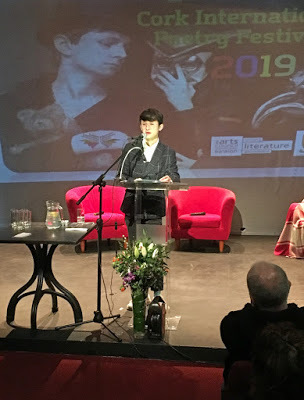
Strange to navigate the busy waters of the Cork International Poetry Festival, and then the very next week--from a distance, via social media--watch writers navigate the even busier waters of the AWP Conference in Portland, Oregon. I managed to photograph every reader I saw in the Cork Arts Theater, except for closing night when my phone died. (Note that this happened mid-email. So I spent an agonizing twenty minutes wondering if I was standing up Kim Addonizio. Luckily, she got the message and made her way to Cask to meet up for dinner.) The downside of the phone dying is that I can't show you Kim's awesome shoes, or the sweet interplay between Billy Collins and Leanne O'Sullivan, a rising star of Irish poetry who had received the Farmgate Café National Poetry Award earlier in the week. The upside is that I was able to relax and fully inhabit those moments.
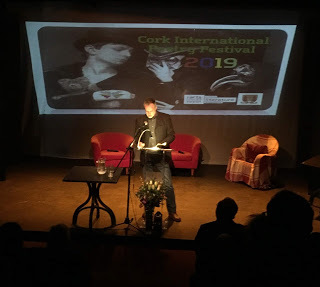 The festival was an extraordinary event overall, and I particularly praise the organizing efforts of Patrick Cotter, Director of the Munster Literature Centre, and MLC administrator James O'Leary. One of the notable features is the commitment to cross-cultural exchange, with several multi-lingual readings. The pleasure of hearing Polish poet Tomasz Różycki (right) was heightened by knowing that a stateside friend, Mira Rosenthal, had done the artful translations of his sonnets. Copies of Colonies sold out almost immediately, but I snagged one and had him sign it; I'm hoping to have Mira sign it, too, at some future AWP.
The festival was an extraordinary event overall, and I particularly praise the organizing efforts of Patrick Cotter, Director of the Munster Literature Centre, and MLC administrator James O'Leary. One of the notable features is the commitment to cross-cultural exchange, with several multi-lingual readings. The pleasure of hearing Polish poet Tomasz Różycki (right) was heightened by knowing that a stateside friend, Mira Rosenthal, had done the artful translations of his sonnets. Copies of Colonies sold out almost immediately, but I snagged one and had him sign it; I'm hoping to have Mira sign it, too, at some future AWP. 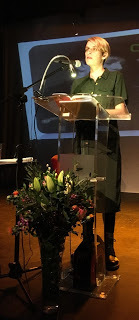 Festival photos aren't the most exciting material; they take place in a monotonous setting. I take them to lock in the remembered experience. But I knew I wanted to post a few photos, and that includes snapshots of my co-reader Kim Moore (left)--what terrific company of smart, funny, feminist poems, including the "All the Men I Never Married" series--and of Shangyang Fang (top), winner of the
Southword Journal
's Gregory O'Donoghue International Poetry Competition, whose work showed daring and exuberance in its intimacies of image, with intriguing choices of when to dart like a diving bird and when to meander along the stream of consciousness. Another favorite was Sasha Dugdale, who read an astonishing title poem from her collection Joy that channels the voice of Catherine Blake (William's wife and collaborator on his printmaking); I bought the book and devoured the whole thing later that night. I was thrilled to see students from both University College Cork and MLC mentees present at the Cork Public Library, which is also where Cumbrian poet Katie Hale read from Assembly Instruction, winner of this year's Fool for Poetry Chapbook Competition. Her "Teaching Grammar in a Poetry Lesson" is an instantly satisfying ars poetica, a bit like Billy Collins' "Introduction to Poetry." But unlike the Collins poem it ultimately yields to celebrating the creative instincts skills of the students, rather than disdaining their attachment to meaning. An immense, endearing compassion pervades Hale's work.
Festival photos aren't the most exciting material; they take place in a monotonous setting. I take them to lock in the remembered experience. But I knew I wanted to post a few photos, and that includes snapshots of my co-reader Kim Moore (left)--what terrific company of smart, funny, feminist poems, including the "All the Men I Never Married" series--and of Shangyang Fang (top), winner of the
Southword Journal
's Gregory O'Donoghue International Poetry Competition, whose work showed daring and exuberance in its intimacies of image, with intriguing choices of when to dart like a diving bird and when to meander along the stream of consciousness. Another favorite was Sasha Dugdale, who read an astonishing title poem from her collection Joy that channels the voice of Catherine Blake (William's wife and collaborator on his printmaking); I bought the book and devoured the whole thing later that night. I was thrilled to see students from both University College Cork and MLC mentees present at the Cork Public Library, which is also where Cumbrian poet Katie Hale read from Assembly Instruction, winner of this year's Fool for Poetry Chapbook Competition. Her "Teaching Grammar in a Poetry Lesson" is an instantly satisfying ars poetica, a bit like Billy Collins' "Introduction to Poetry." But unlike the Collins poem it ultimately yields to celebrating the creative instincts skills of the students, rather than disdaining their attachment to meaning. An immense, endearing compassion pervades Hale's work. I took a little downtime this past weekend to update my teaching files. Since I'm not working toward some future tenure application, it's important to pause periodically and do my own self-archiving of the lessons I've created, including fine-tuning of handouts and syllabi. My commitments in Cork include a graduate-level workshop at University College Cork, where we used the sonnet as a recurring building block of formal engagement; two community menteeships with accomplished students, tailored to their needs on such topics as sequence-building and manuscript organization; and a standalone meeting with the women's group of the Cork Migrant Centre, housed at Nano Nagle Place, where we discussed poems of origin and heritage. As part of the festival time, I offered a four-day seminar class on "Bringing the World to the Poem" that ended up filling to capacity.
As has happened at every turn in Ireland, I was delighted by the curiosity and sophistication brought to the close readings. Each day I turned up with eight to ten possible poems, then went with the five that felt right for the pacing and interests of the group. I thought it'd be fun to share here--links to texts where available--along with photos of the prompts I offered. (If you're reading this with a screen reader and want access, email me at earthlink.net and I'll transcribe.) They're organized by theme, which is how we progressed day by day. One of the decisions I had to make was whether to try and feature Irish poets, but I decided to play to my strengths of familiarity and shared culture. As I told the group, they didn't need an American poet barging in to teach them about Seamus Heaney.
ANIMALS
Mark Doty - "Golden Retrievals"
Ada Limón - "How to Triumph Like a Girl"
Jamaal May - "There Are Birds Here"
Lucia Perillo - "Shrike Tree"
Dan Chiasson - "The Elephant"
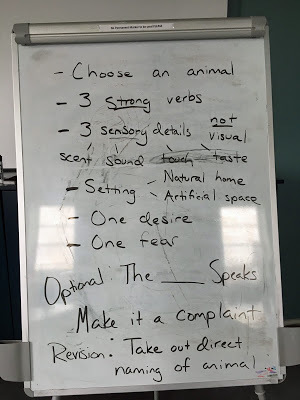
FOOD
Elton Glaser - "Shucking"
Henry Taylor - "Artichoke"
Wisława Szymborska - "The Onion"
Kevin Young - "Ode to Pork"
Naomi Shihab Nye - "My Uncle's Favorite Coffee Shop"
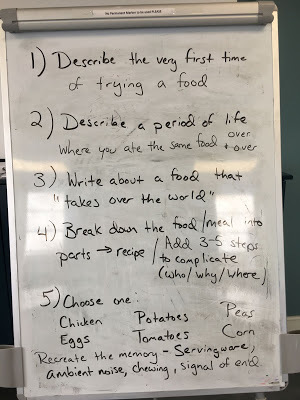
TRAVEL
Richard Blanco - "Looking for the Gulf Motel"
Cyrus Cassells - "Return to Florence"
Beth Ann Fennelly - "Souvenir"
Sally Wen Mao - "Riding Alone for Thousands of Miles"
Megan Fernandes - "Amsterdam"
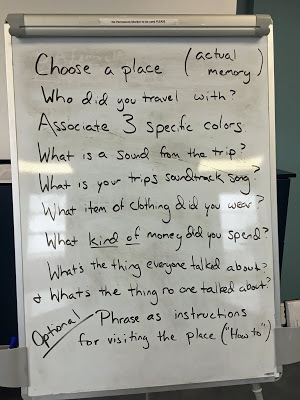
SCIENCE
Camille T. Dungy - "The Blue"
Kimiko Hahn - "Maude"
Jane Hirshfield - "For the Lobaria, Usnea, Witches Hair, Map Lichen, Beard Lichen, Ground Lichen, Shield Lichen"
A. Van Jordan - "Einstein Defining Special Relativity"
Alberto Ríos - "Some Extensions on the Sovereignty of Science"
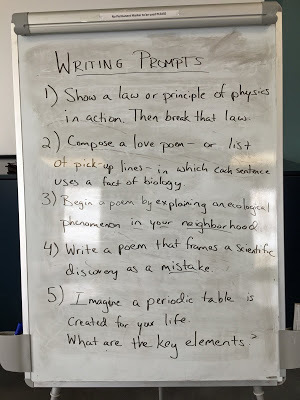
Turns out that in addition to wrapping up finals grading at UCC and working with my community mentees, I have one more unexpected teaching opportunity on the docket. As part of the daily prep and handout-making for the festival workshop, I made friends with the good folks at Mouse Internet Cafe. So when I found out that an instructor had cancelled on them for an event scheduled as part of the Cork Lifelong Learning Festival, I offered to step in. If you happen to be in Cork on Monday, April 8, come hang out with us at 7 PM (location on Barracks Street near the Southgate Bridge). We'll be discussing "Three Poems for People Who Really Dislike Poetry."
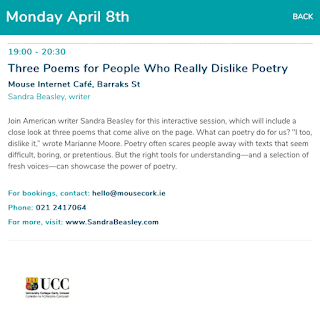
Published on April 01, 2019 09:33
March 1, 2019
The Road to Cork
The universe knew I needed a change. I love DC, but I have been soul-weary. So when the call came from the director of the Munster Literature Centre (an actual phone call) asking if I would take on the John Montague Poetry Fellowship, I said yes.
I had never been to Ireland. In the weeks leading up I fielded kind suggestions of what I had to see in Dublin, in Kerry, the castles and cliffs. but I privately thought I just want to live in Cork. I was determined to embrace this city. This city, in return, has embraced me.
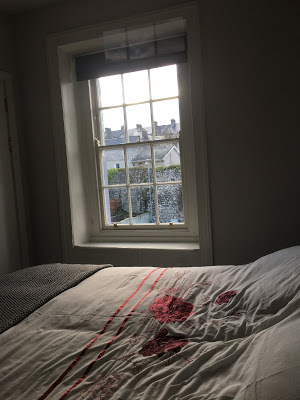 My home is at Nano Nagle Place, where the namesake Honora Nagle is buried. Born in 1718, she went on to open a half-dozen schools (partially in secret, years education was still forbidden to Irish Catholics), to found the Presentation Sisters, and to spend her life serving Cork's people. My apartment is simple and bright, with a full kitchen. My neighbors are nuns.
My home is at Nano Nagle Place, where the namesake Honora Nagle is buried. Born in 1718, she went on to open a half-dozen schools (partially in secret, years education was still forbidden to Irish Catholics), to found the Presentation Sisters, and to spend her life serving Cork's people. My apartment is simple and bright, with a full kitchen. My neighbors are nuns.
Every Tuesday walk up and around a cobblestone bend to Alchemy Coffee, where I get a regular black coffee to go. From there I quickstep to the University College Cork, where I lead a workshop for ten graduate students. We're using the building block of the sonnet, complicated by extensions and playfulness in the form: Rita Dove, Mark Doty, Wilfred Owen, e.e. cummings, Olena Kalytiak Davis, with Terrance Hayes and Wanda Coleman on the horizon. Along the way we're detouring to look at poets such as Elizabeth Bishop, Harryette Mullen. Five workshop poems per class is the magic number--crunched, sure, but manageable, unlike the six per class that I always tell myself I can do (but never can).
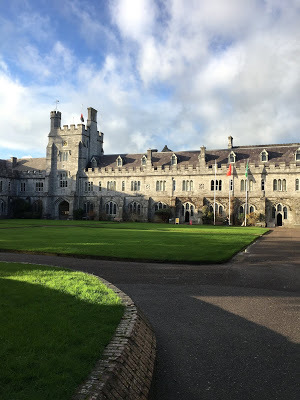
Wednesdays, I try to not leave the apartment at all. I stay in and I rest, and I write.
On Thursdays and Fridays, I have two-hour one-on-one sessions with poets in the community, who I chose based on applications with work samples and project statements. These are a different space, chatty and collegial, but at the same time I can really push on individual needs and risks to be taken. Although I orchestrate readings for each given week, I don't try to do written feedback--they simply leave with the notes they've taken during our conversations. I'm struck by how energized I am by a model where each week holds six hours of "live" teaching paired with two hours spent on notes and prep, versus what is usually the opposite ratio.
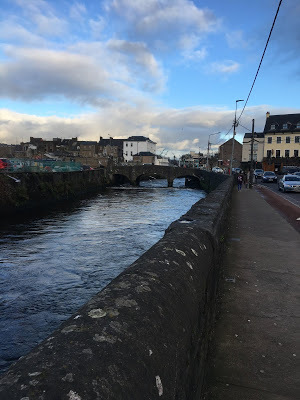
That leaves a long weekend of Saturday & Sunday & Monday. There's terrific music at places like the Corner House, Charlie's, and Sin E. Pub life is as simple as walking in to pick out your draft (I prefer Beamish), plunking down the requisite stack of coins, and striking up craic with whoever is in earshot. The O'Bheal poetry series, which includes an open mic, takes place above the Long Valley Bar (the "Hayloft") and runs until midnight on Monday nights. The Triskel Church, just over the bridge, has been converted into a theater--I watched Casablanca there on Valentine's Day. I got a balcony seat for the "Johnny Cash Road Show" at the Everyman Theater, where everyone was singing along, and second-row dead-center for the Irish National Opera's Orfeo ed Eurydice, in which all the principle roles were sung by women, the choreographer did double-duty as the director, and the conductor played harpsichord.
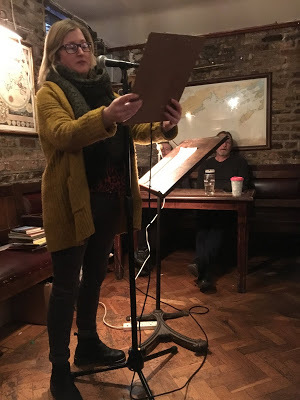
One of the best things about conversation here is that when you tell someone you're working as a poet, they don't freeze up or look embarrassed for you There's always a common ground--another writer they know, or a favorite book to recommend. Walking down the street, one passes whole blocks mural in the words of poets. I have difficulties with the brogue, sometimes mistaking a question for a statement. But I have no difficulty owning who I'm here to be. Even my American-ness is greeted kindly, versus the self-disgust I've internalized as a function of the last few years' national affairs. As I experienced in Cyprus, the rest of the world does a much better job remembering how young we are as a country.
I've been modest in my restaurant ambitions, mostly happy to have the roast chicken lunch at Farmgate or a quick sushi bite. The Quay Co-op (I had to learn to say "key," not "qway") has fresh produce, canned curries, brown rice. I have made good stir fries, squid ink pasta tossed with tuna, but I'm saving the more intensive prep for when I can team up with my husband. We'll walk to the English Market and buy a meal's ingredients from A to Z. I miss him terribly. If I could figure out a way to smuggle the kitty into his suitcase when he comes over, I would.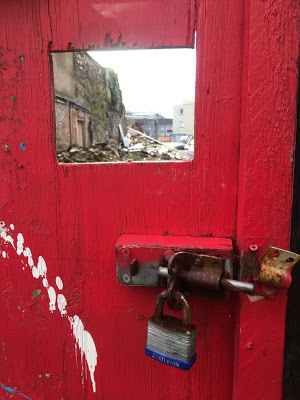
A fellowship isn't a residency. My duties are more complicated than that--not only because of financial concerns, but because I feel a general responsibility to be out and about in the city. But like a residency, this time gives me distance and fresh perspective on life at home. I miss so much, but I don't miss everything. And letting go of those things that I don't miss will be an important part of returning.
The weather can be mercurial. The hills are steep. Strange to become a version of myself that reaches for blue jeans and flats, instead of skirts and heels, and buries herself in warm clothing. But this is a deeply good place, and I am grateful to be here.
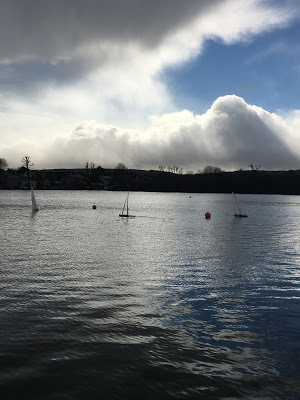
I had never been to Ireland. In the weeks leading up I fielded kind suggestions of what I had to see in Dublin, in Kerry, the castles and cliffs. but I privately thought I just want to live in Cork. I was determined to embrace this city. This city, in return, has embraced me.
 My home is at Nano Nagle Place, where the namesake Honora Nagle is buried. Born in 1718, she went on to open a half-dozen schools (partially in secret, years education was still forbidden to Irish Catholics), to found the Presentation Sisters, and to spend her life serving Cork's people. My apartment is simple and bright, with a full kitchen. My neighbors are nuns.
My home is at Nano Nagle Place, where the namesake Honora Nagle is buried. Born in 1718, she went on to open a half-dozen schools (partially in secret, years education was still forbidden to Irish Catholics), to found the Presentation Sisters, and to spend her life serving Cork's people. My apartment is simple and bright, with a full kitchen. My neighbors are nuns. Every Tuesday walk up and around a cobblestone bend to Alchemy Coffee, where I get a regular black coffee to go. From there I quickstep to the University College Cork, where I lead a workshop for ten graduate students. We're using the building block of the sonnet, complicated by extensions and playfulness in the form: Rita Dove, Mark Doty, Wilfred Owen, e.e. cummings, Olena Kalytiak Davis, with Terrance Hayes and Wanda Coleman on the horizon. Along the way we're detouring to look at poets such as Elizabeth Bishop, Harryette Mullen. Five workshop poems per class is the magic number--crunched, sure, but manageable, unlike the six per class that I always tell myself I can do (but never can).

Wednesdays, I try to not leave the apartment at all. I stay in and I rest, and I write.
On Thursdays and Fridays, I have two-hour one-on-one sessions with poets in the community, who I chose based on applications with work samples and project statements. These are a different space, chatty and collegial, but at the same time I can really push on individual needs and risks to be taken. Although I orchestrate readings for each given week, I don't try to do written feedback--they simply leave with the notes they've taken during our conversations. I'm struck by how energized I am by a model where each week holds six hours of "live" teaching paired with two hours spent on notes and prep, versus what is usually the opposite ratio.

That leaves a long weekend of Saturday & Sunday & Monday. There's terrific music at places like the Corner House, Charlie's, and Sin E. Pub life is as simple as walking in to pick out your draft (I prefer Beamish), plunking down the requisite stack of coins, and striking up craic with whoever is in earshot. The O'Bheal poetry series, which includes an open mic, takes place above the Long Valley Bar (the "Hayloft") and runs until midnight on Monday nights. The Triskel Church, just over the bridge, has been converted into a theater--I watched Casablanca there on Valentine's Day. I got a balcony seat for the "Johnny Cash Road Show" at the Everyman Theater, where everyone was singing along, and second-row dead-center for the Irish National Opera's Orfeo ed Eurydice, in which all the principle roles were sung by women, the choreographer did double-duty as the director, and the conductor played harpsichord.

One of the best things about conversation here is that when you tell someone you're working as a poet, they don't freeze up or look embarrassed for you There's always a common ground--another writer they know, or a favorite book to recommend. Walking down the street, one passes whole blocks mural in the words of poets. I have difficulties with the brogue, sometimes mistaking a question for a statement. But I have no difficulty owning who I'm here to be. Even my American-ness is greeted kindly, versus the self-disgust I've internalized as a function of the last few years' national affairs. As I experienced in Cyprus, the rest of the world does a much better job remembering how young we are as a country.
I've been modest in my restaurant ambitions, mostly happy to have the roast chicken lunch at Farmgate or a quick sushi bite. The Quay Co-op (I had to learn to say "key," not "qway") has fresh produce, canned curries, brown rice. I have made good stir fries, squid ink pasta tossed with tuna, but I'm saving the more intensive prep for when I can team up with my husband. We'll walk to the English Market and buy a meal's ingredients from A to Z. I miss him terribly. If I could figure out a way to smuggle the kitty into his suitcase when he comes over, I would.

A fellowship isn't a residency. My duties are more complicated than that--not only because of financial concerns, but because I feel a general responsibility to be out and about in the city. But like a residency, this time gives me distance and fresh perspective on life at home. I miss so much, but I don't miss everything. And letting go of those things that I don't miss will be an important part of returning.
The weather can be mercurial. The hills are steep. Strange to become a version of myself that reaches for blue jeans and flats, instead of skirts and heels, and buries herself in warm clothing. But this is a deeply good place, and I am grateful to be here.

Published on March 01, 2019 13:48
February 1, 2019
January Tidings
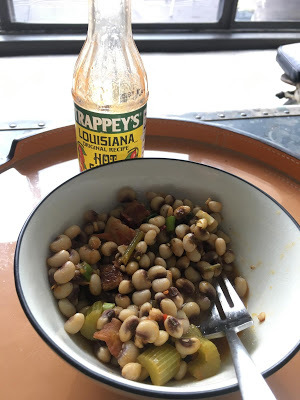
I made black-eyed peas on New Year's day. I'd need every bit of good luck I could get, since the next day held a fourteen-hour hell-drive straight to Tampa, arriving in time to teach with my MFA program's residency. Nothing says "fancy life of a poet" like napping for an hour in front of a South Carolina rest stop. But increasingly, Tampa has become such a dear place to me. I love my students. I love waking up at the Sheraton and looking out along the Riverwalk. Funny how something that began as a source of anxiety--I'd had no previous graduate-level teaching experience before joining faculty--has, five years later, become an anchor and such a valued part of my life. This particular residency, we were fortunate enough for a visit from Meg Day: amazing poet, unforgettable lecturer, friend, kin.
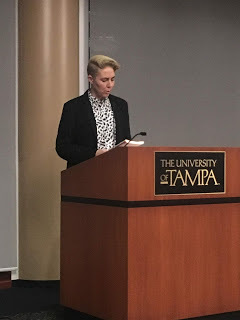
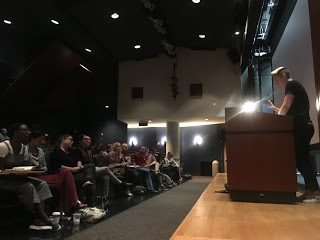
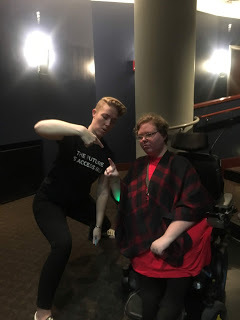
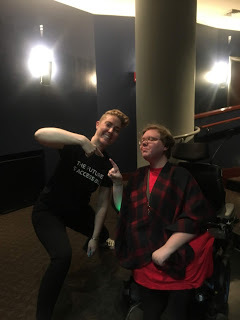
Seeing Meg connect with Kayla, this term's Outstanding Graduate Student--graduating with a superb essay collection I was fortunate to help with--was all joy.
From Tampa, on to Naples to visit family. We wandered through the Naples Botanical Garden, then got bug-bit while enjoying dinner courtesy a campground of food trucks set up by the water. Adding a somewhat surreal element, Abby Wambach was chilling nearby with her partner and their dog in a very nice motor-boat.
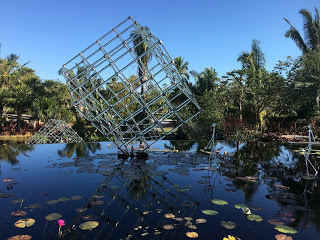
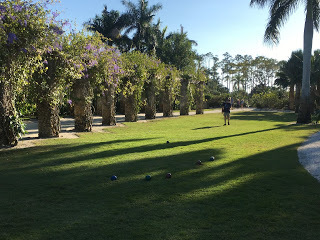
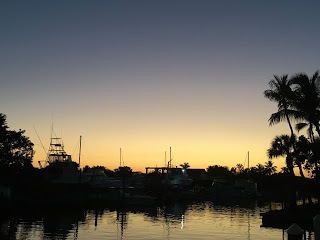
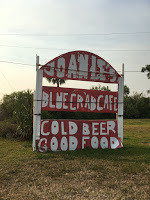 If you happen to be making your way from Naples to Miami, you'll be driving through the Everglades and I highly recommend you stop off at Joanie's. They took good care of me, allergies and all, from the lima bean soup to the fresh-grilled grouper atop salsa made that morning and a salad dotted with tiny flowers that had been grown in the cafe's front yard. I also had a moment during a rest stop when a crowd looked at me funny, as I walked along talking on my cell phone. So I turned back and looked--I'd passed right by an alligator. He was too sleepy to notice me.
If you happen to be making your way from Naples to Miami, you'll be driving through the Everglades and I highly recommend you stop off at Joanie's. They took good care of me, allergies and all, from the lima bean soup to the fresh-grilled grouper atop salsa made that morning and a salad dotted with tiny flowers that had been grown in the cafe's front yard. I also had a moment during a rest stop when a crowd looked at me funny, as I walked along talking on my cell phone. So I turned back and looked--I'd passed right by an alligator. He was too sleepy to notice me. 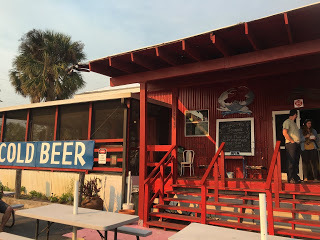
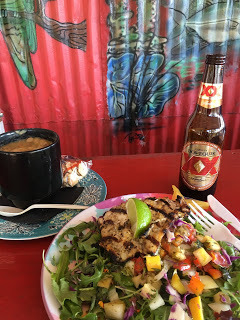
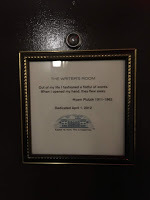 In Miami, I had a brief residency at The Betsy. The Writer's Room program is amazing (in return for a reading and a meet-the-artist reception, they give you a place to stay and a $50 / day tab at their restaurants). That said, one has to get past the strangeness of the entire staff knowing who you are and why you're there. SWWIM was kind enough to host our reading, where I finally got to meet Vinegar and Char contributor Elisa Albo. (Have you signed up for SWWIM's daily poem? You should!) I read four books in two days--Jessica Hopper's Night Moves, David Menconi's Ryan Adams: Losering, a Story of Whiskeytown, Alexander Chee's How to Write an Autobiographical Novel, and Porochista Khakpour's Sick--lounging whenever I could by the Betsy's rooftop pool. I checked into a cat cafe for an hour. And I walked down to the South Pointe Park, a walk that brought me comfort so many days back when I was living in Miami in February 2011, as part of a now-defunct artist residency. I'm working on my next nonfiction book, and this was the perfect setting. But that's all I'll say about that for now.
In Miami, I had a brief residency at The Betsy. The Writer's Room program is amazing (in return for a reading and a meet-the-artist reception, they give you a place to stay and a $50 / day tab at their restaurants). That said, one has to get past the strangeness of the entire staff knowing who you are and why you're there. SWWIM was kind enough to host our reading, where I finally got to meet Vinegar and Char contributor Elisa Albo. (Have you signed up for SWWIM's daily poem? You should!) I read four books in two days--Jessica Hopper's Night Moves, David Menconi's Ryan Adams: Losering, a Story of Whiskeytown, Alexander Chee's How to Write an Autobiographical Novel, and Porochista Khakpour's Sick--lounging whenever I could by the Betsy's rooftop pool. I checked into a cat cafe for an hour. And I walked down to the South Pointe Park, a walk that brought me comfort so many days back when I was living in Miami in February 2011, as part of a now-defunct artist residency. I'm working on my next nonfiction book, and this was the perfect setting. But that's all I'll say about that for now. 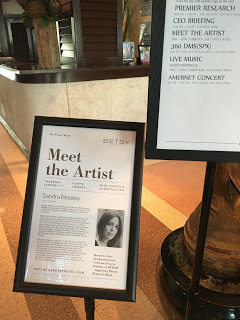
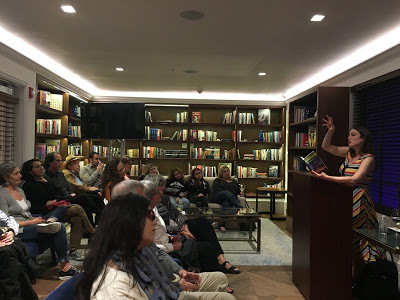
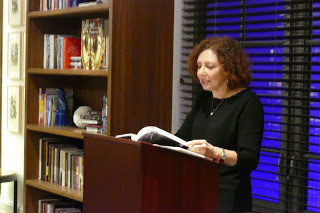
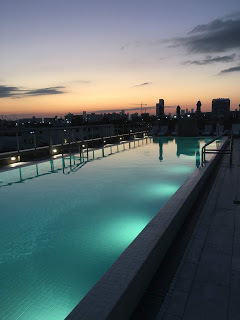
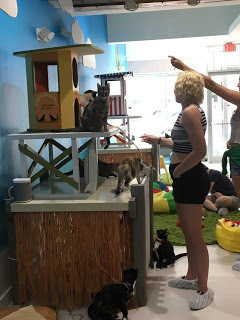
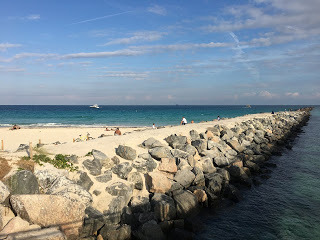
Lyn at Square Books sent me a snapshot of the year-end display of bestselling titles in the front window. And look: Vinegar and Char is right there, nestled at #48. I'm grateful because I'm so dang proud of this anthology and, for various reasons, I haven't gotten to celebrate it properly outside Mississippi. But my March 11 reading at the Folger Shakespeare Library--with contributors Atsuro Riley and Sean Hill--will go a ways toward fixing that.

Thank you, January, from delivering me from the arms of Florida into the embrace of the new: I'm in Ireland.
I'm settling in as this spring's John Montague International Poetry Fellow for the Munster Literature Centre. That means teaching a workshop over at University College Cork, mentoring a few community folks, and leading a four-day seminar on "Bringing the World to the Poem" (still some spots available) as part of the poetry festival March 20-23. (Sorry to miss you, AWP.) People have been kind enough to make all sorts of tourist suggestions, and I'm sure I'll explore as the weeks go on. For now, I'm just happy to be in one place.
Published on February 01, 2019 07:19
December 22, 2018
The Hungry Poet: Carrot Salad Edition

This time of year I end up buying ingredients for specific dishes--and then, the leftover odds and ends clutter up my pantry for a while. Rather than letting them wither and go stale, I have to remind myself to make dishes that can incorporate these "leftovers." Soups and stews are great for this. So is carrot salad.
The main ingredients:
-Shredded carrots (originally bought for a stir-fry)
-Chickpeas (originally bought for a curry)-Golden raisins (originally bought for a cauliflower dish)-Sliced almonds (originally bought for a salad)
You can set the proportions however you want, but I like 2: 2: 1: 1. Meaning I used 2/3 of a store-bought bag of shredded carrot, a can of chickpeas, about a half-cup of raisins, and about a half-cup of slivered almonds.
A lot of recipes for Moroccan carrot salad (which this loosely resembles) present this as something to assemble raw. But uncooked carrots, onions, and peppers can be difficult for folks to eat. I prefer to cook it all lightly together, to soften the ingredients.
To start?
Using household staples, this is my base for...well, just about everything.
-Tablespoon of olive oil-Two shallots, chopped fine-Spoonful of chopped garlic-Serrano pepper, sliced thin (can substitute with jalapeño, poblano, etc.)
After that's been sautéing together for a couple of minutes, push your base to the sides of the pot (or pan, or wok), put in the carrots over the burner's main heat, and season. Drizzle in a little extra olive oil if it looks dry. Let that cook on medium for a few minutes, and stir together. Turn the heat to low--at this point, you're not really "cooking" so much as heating things through--put in the chickpeas, season, and warm for another couple of minutes. Finally, stir in the golden raisins (seasoned) and the slivered almonds (toasted).
Total stovetop time is about ten minutes. Then transfer to your storage / serving bowl. I like to chill or rest everything together for at least an hour afterward, so the flavors can marry, but it's not essential.
To season?
Years ago, I got in the habit of associating each spice or flavoring agent with a single main ingredient, rather than adding them all at once. I think the palate notices each element more clearly that way. So when I add the carrot, I season them with cumin (maybe about a tablespoon). When I add the chickpeas, I season them with cayenne or paprika (no more than a teaspoon). I plump up the golden raisins with a big splash of red wine vinegar and olive oil, to balance their sweetness.
To toast the almonds?
Toasting nuts can be maddening. You wait, and wait, and wait; you turn your back on the toaster, and they burn in seconds. Then I learned the trick of toasting nuts in the microwave. (Yes, really.) Spread in a thin layer--I use a handled bowl, uncovered--and take advantage of the microwave's "minute plus" function, tossing and checking each time. Toasting a half-cup took three minutes.
Toasting nuts in the microwave for garnish is an especially good trick for when you're hosting a dinner party, and toaster / oven / stovetop space is in high demand.
To finish?
I zested a lemon over the mix, then squeezed in about half the juice. Salt and pepper to taste. Fresh herbs would be great here--chopped parsley, mint, cilantro, or basil. But again, the point is to use what you've got handy. I reached for the jar of dried cilantro and stirred in a few generous shakes.
A big batch will last in the fridge for a few days and can be used any number of ways:
-Paired with arugula or spinach for a larger salad, perhaps with good canned tuna; -warmed and served alongside roasted chicken and rice; -layered on top of toast;...and forked cold out of the fridge, in the middle of the night, by a hungry poet.
Published on December 22, 2018 07:47
November 26, 2018
Six Posts I Didn't Write & Alex Guarnaschelli
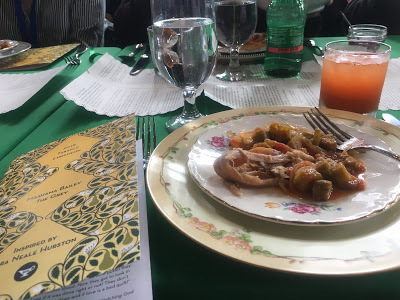
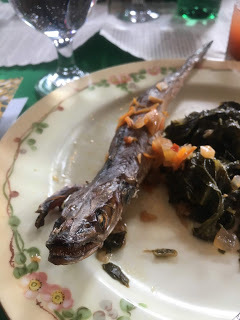
I was going to tell you about being in Oxford, Mississippi, for the annual SFA symposium to launch Vinegar and Char: Verse from the Southern Foodways Alliance . I was going to tell you about how Monique Truong rocks a lecture like no other. I was going to tell you about a meal inspired by the work of Zora Neale Hurston--Tabasco-braised pulled rabbit, collards with pork tails, whole roasted whitefish--courtesy Chef Mashama Bailey of The Grey in Savannah, Georgia. I was going to tell you about being brought to tears by the unexpected kindness of SFA staff conspiring with John Currence & City Grocery restaurant crew to make sure I could try the food being served, amidst the allergy minefield of creative catering for 200+ people. I was going to tell you about getting to read poems alongside Kevin Young, and recording for the Vinegar and Char-themed GRAVY podcast, seeing old haunts and old friends, buying a Blair Hobbs painting, and stealing an extra day to go buy records at The End of All Music.
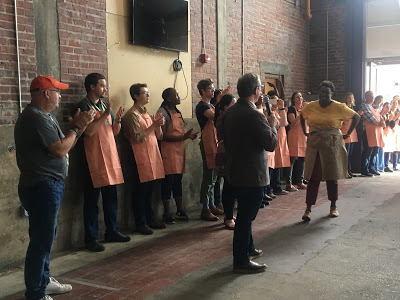
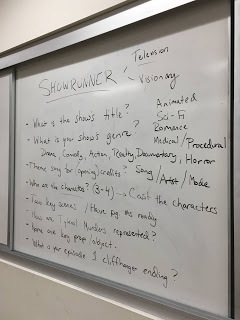 I was going to tell you about "Showrunner," one of my favorite in-class exercises that I've developed for teaching Writers in Print and Person at American University. This small-group project solves two problems at once--how to facilitate discussion of prose when students are midway through the book (in this case, Leslie Pietrzyk's terrific novel Silver Girl), and how to help students experience a variation on the agency of the writing process. We move the novel or nonfiction work to the medium of television and, from there, they pitch me the show they would create: from genre and format--to theme song--to casting, to key scenes, to cliffhangers. I love hearing the excitement in the students' voices as they collaborate and even bicker about the decisions to be made. The only challenge is having to calibrate my knowledge to their era of pop-culture references (having to remember on the fly, for example, how to spell "Cara Delevingne").
I was going to tell you about "Showrunner," one of my favorite in-class exercises that I've developed for teaching Writers in Print and Person at American University. This small-group project solves two problems at once--how to facilitate discussion of prose when students are midway through the book (in this case, Leslie Pietrzyk's terrific novel Silver Girl), and how to help students experience a variation on the agency of the writing process. We move the novel or nonfiction work to the medium of television and, from there, they pitch me the show they would create: from genre and format--to theme song--to casting, to key scenes, to cliffhangers. I love hearing the excitement in the students' voices as they collaborate and even bicker about the decisions to be made. The only challenge is having to calibrate my knowledge to their era of pop-culture references (having to remember on the fly, for example, how to spell "Cara Delevingne").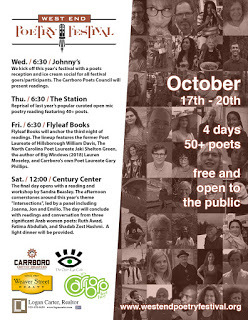 I was going to tell you about going to North Carolina for the West End Poetry Festival--where the Carrboro Poets Council partners with the town to produce four days of reading upon reading upon reading, inclusive of all styles and topics. (A 12-person council that hangs out in someone's living room once a month, and is trusted and given the resources to organize. Wouldn't it be amazing if we could so easily facilitate the DC government's relationship to poetry and the arts? Ahem.) I got to talk about poetry of food, I got to hear Ruth Awad, the Chief of Police volunteered to be on-site monitor so we could drink wine in the Century Center, and signs that would usually direct traffic instead directed "Slow Down for Poetry." I was going to tell you about helping someone write an ode to barbecue, and watching that same gentleman (husband to our hosting Poets Council member) run the toy trains in the garage-loft where we'd been staying. I was going to tell you about buying hatch chiles and okra from the Farmer's Market.
I was going to tell you about going to North Carolina for the West End Poetry Festival--where the Carrboro Poets Council partners with the town to produce four days of reading upon reading upon reading, inclusive of all styles and topics. (A 12-person council that hangs out in someone's living room once a month, and is trusted and given the resources to organize. Wouldn't it be amazing if we could so easily facilitate the DC government's relationship to poetry and the arts? Ahem.) I got to talk about poetry of food, I got to hear Ruth Awad, the Chief of Police volunteered to be on-site monitor so we could drink wine in the Century Center, and signs that would usually direct traffic instead directed "Slow Down for Poetry." I was going to tell you about helping someone write an ode to barbecue, and watching that same gentleman (husband to our hosting Poets Council member) run the toy trains in the garage-loft where we'd been staying. I was going to tell you about buying hatch chiles and okra from the Farmer's Market. 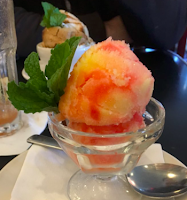 I was going to tell you about getting the best brunch of my recent memory at Crook's Corner on our way out of town. The one thing I was really hoping to have was black-eyed peas, and they delivered. With a side of bacon. Chef Bill Smith, who I'd met at the SFA symposium in Oxford, "saw" I was in the dining room courtesy of Twitter and, from afar, sent out a spicy sorbet. (Yes, that's what I meant to write--a spicy sorbet. He is generous enough to publicize the recipe, which you can find here: water, sugar, OJ, zest, and Red Hots. Legit.)
I was going to tell you about getting the best brunch of my recent memory at Crook's Corner on our way out of town. The one thing I was really hoping to have was black-eyed peas, and they delivered. With a side of bacon. Chef Bill Smith, who I'd met at the SFA symposium in Oxford, "saw" I was in the dining room courtesy of Twitter and, from afar, sent out a spicy sorbet. (Yes, that's what I meant to write--a spicy sorbet. He is generous enough to publicize the recipe, which you can find here: water, sugar, OJ, zest, and Red Hots. Legit.)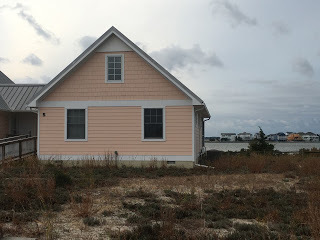
I was going to tell you that I then headed to Delaware's Seashore State Park, and for three nights shacked up in a cabin by the Indian River with Leslie, workshopping with eleven poets while she workshopped with eleven prose writers. The boats harbored in the marina rocked and squealed. We had morning seminars on topics such as working from autobiography, giving a good reading, and radical revision. We finished with an open mic. The students gave us each a brown paper bag full of thank-you notes. I was going to tell you that I made time for walking on the beach barefoot.
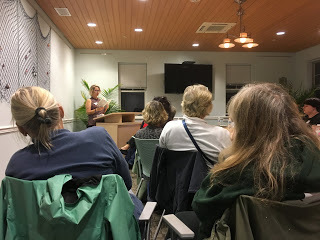
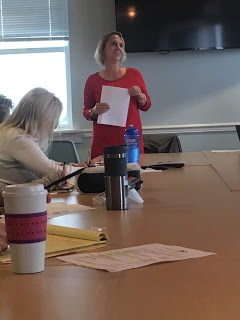
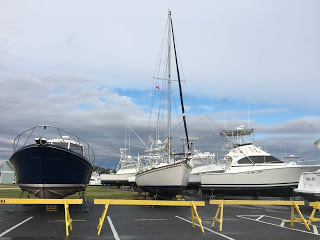
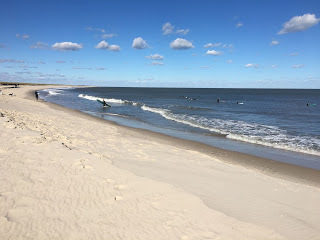
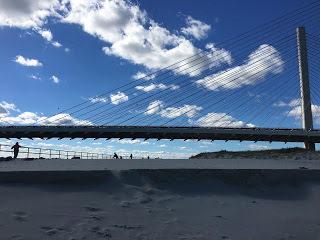
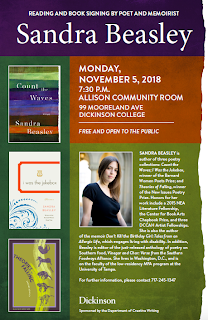 I was going to tell you that I drove straight from Delaware to Carlisle, Pennsylvania, where I spent a very rainy but wonderful day and a half at Dickinson College. The last time I was in Carlisle was years ago, when my father was at the War College. My primary host was Adrienne Su, who I would choose to have lunches with every week--smart, funny, kind, and ridiculously talented at wielding the traditions of poetry. People like Adrienne are why people opt for jobs with colleagues. There was a cat in residence at the roadside farm en route, where I bought fresh cider and purple cauliflower and local mushrooms, and a cat in residence at Whistestop Bookshop. For good measure, I bought a copy of Doris Lessing's On Cats. I also encountered no less than five horses (with Amish buggies) on the roads of rural Pennsylvania, but I couldn't stop the car to get a proper photograph.
I was going to tell you that I drove straight from Delaware to Carlisle, Pennsylvania, where I spent a very rainy but wonderful day and a half at Dickinson College. The last time I was in Carlisle was years ago, when my father was at the War College. My primary host was Adrienne Su, who I would choose to have lunches with every week--smart, funny, kind, and ridiculously talented at wielding the traditions of poetry. People like Adrienne are why people opt for jobs with colleagues. There was a cat in residence at the roadside farm en route, where I bought fresh cider and purple cauliflower and local mushrooms, and a cat in residence at Whistestop Bookshop. For good measure, I bought a copy of Doris Lessing's On Cats. I also encountered no less than five horses (with Amish buggies) on the roads of rural Pennsylvania, but I couldn't stop the car to get a proper photograph. 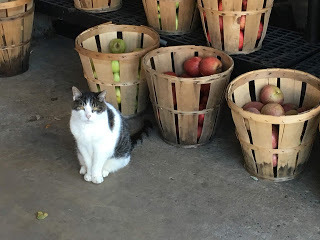
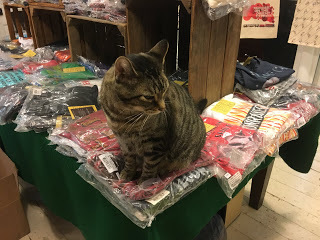
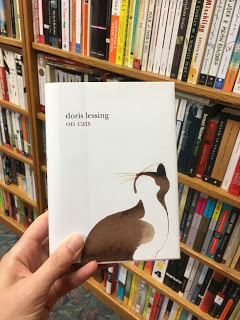
After my last classroom visit, I should have gotten on the road to drive home. But instead I improvised a two-hour detour into The ClothesVine. After eight years of being on the road more than I'd ever imagined, my wardrobe is tired. And too damn tight. I'm banishing a certain size pants. I'm investing in huge, soft sweaters.
I wish I didn't feel insecure about that. I wish each new expenditure didn't feel like paying tax on lack of discipline. I have traveled thousands on thousands of miles since 2010. I've tested out myself as a teacher. I've written a books, with another in the hands of the editor right now, and edited an anthology. Am I going to romanticize back when the menu consisted of orange juice, twelve almonds, a banana, five Triscuits, another five Triscuits, spinach, tomatoes, one whole avocado, and maybe french fries, if craving something hot?
This brings me to Alex Guarnaschelli. Nothing particularly epic, except the realization that I find it tremendously soothing to watch talented female chefs like Guarnaschelli (or Amanda Freitag, pictured here as her competitor on "Next Iron Chef") do their thing. There's a centering here. There's palpable bad-ass-ery. If there is a distillation of my 2019 goals, it's to be found somewhere in this generous, stylish confidence.
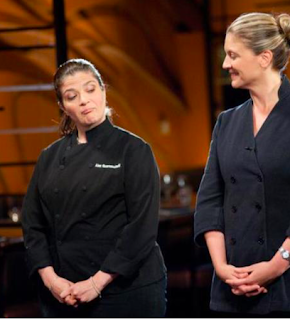
I'm going to tell you that new red shoes were a gift worth giving to myself.
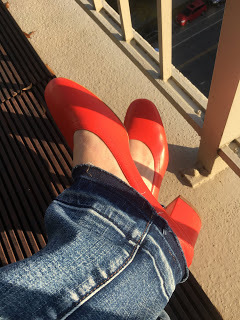
I'm going to tell you that even though chefs took great care of me while on the road, it feels good to cook from scratch again.
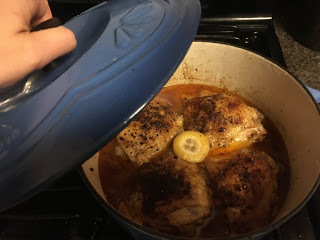
I am also going to tell you that cooking is complicated by the revelation that my ten-year-old cat has a new proclivity for jumping on countertops.
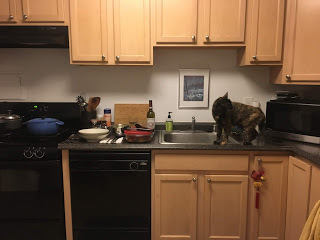
And this: I'm heading to Ireland next spring.
Pableaux Johnson took my photo in Oxford. I look a little older than the girl in the upper-right of this blog design. But I think I look a little more accomplished, too.
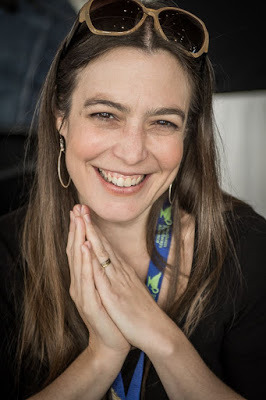
Published on November 26, 2018 04:38
October 7, 2018
Holding Space
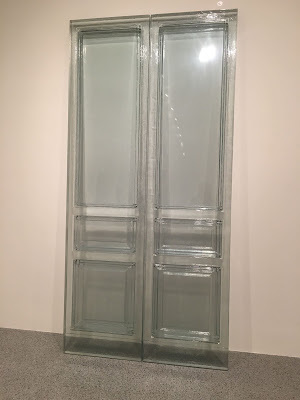
English artist Rachel Whiteread uses plaster, rubber, and resin to cast spaces we take for granted--doors and bathtubs; the inside of hot water bottles; the undersides of chairs; the cardboard spools for toilet paper. She was the first woman to win the Turner Prize, in 1993, after casting a whole house that had been scheduled for demolition. Although I've recognized her work at various museums over the years, the exhibit at the National Gallery of Art provides a whole new level of breadth and context. If you come to DC between now and January 2019, be sure and visit.
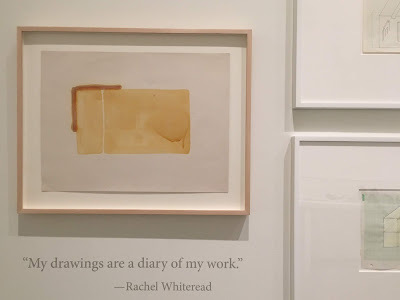
I've been waking up with my jaw already clenched, too many days in a row, in dread of each day's news. Sometimes fantastic things happen--the MacArthur "genius" grant recipients for this year include Natalie Diaz and Kelly Link--and sometimes someone shows me a video of a basket of baby sloths or a baby flamingo taking its first steps, and sometimes it's just enough to be in the same space as a friend, laughing. Sometimes solace lasts for the length of a poem. But all is a bulwark against the sense that our checks and balances no longer operate as they should. Perhaps they never did. The calls of "Remember on November 6!" ring a bit hollow when you're a resident of Washington, D.C.--almost 700,000 of us, and not one seat in the Senate. Imagine how differently the last few weeks might have gone, had we had voting representation.
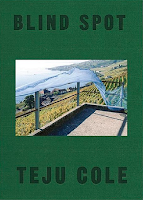 Teju Cole visited American University this past week. My undergraduate students for "Writers in Print and Person" read Blind Spot, photographs juxtaposed with flash nonfiction texts. The book is physically gorgeous as an artifact and gave us means to discuss Roland Barthes' Camera Lucida, "studium" and "punctum." Barthes developed this vocabulary to talk primarily about portraiture; in moving the approach to landscape photography, which Cole does--and largely devoid of people's faces--I'd argue that the explicit text teases a "punctum" to the surface that would otherwise stay invisible, but inherent to the impulse of the photographer. His lecture did the thing great art does, selfishly, which was that it made me want to hole up and think and write.
Teju Cole visited American University this past week. My undergraduate students for "Writers in Print and Person" read Blind Spot, photographs juxtaposed with flash nonfiction texts. The book is physically gorgeous as an artifact and gave us means to discuss Roland Barthes' Camera Lucida, "studium" and "punctum." Barthes developed this vocabulary to talk primarily about portraiture; in moving the approach to landscape photography, which Cole does--and largely devoid of people's faces--I'd argue that the explicit text teases a "punctum" to the surface that would otherwise stay invisible, but inherent to the impulse of the photographer. His lecture did the thing great art does, selfishly, which was that it made me want to hole up and think and write. 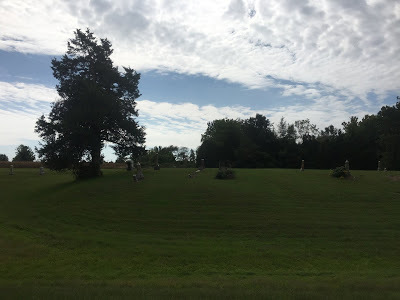
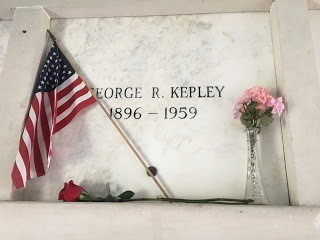
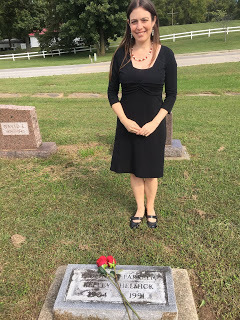 Photographs had already been on my mind the weekend before, when my sister and I drove to Kinmundy, Illinois, for my grandmother's memorial service. We went to Evergreen Cemetery, walked through one of my grandfather's childhood homes, had lunch at the Methodist church, and looked through the historical society's archives of photographs and newspapers. We stayed in Salem, the closest nearby town with a hotel. The Pruetts are prevalent in the history of Kinmundy's thriving days, though my grandmother, seems important to note, was a Kepley by birth. We took a couple of hours to drive to nearby Louisville, searching out the cemetery where her parents were buried. However many years ago, it was probably my grandmother's hand that tipped the American flag within the framing of her father's mausoleum plot. Widowed early, remarried, my great-grandmother (and namesake) was laid to rest with her family, the Farrells. We left the last of the morning's red roses with their graves. Since the high school's homecoming weekend had crowded most of the restaurants that night, we went to the parking-lot Denny's for dinner. I ordered a bourbon-chicken-vegetable skillet thing and watched a table of teenage girls fuss with their corsages and sparkly dresses.
Photographs had already been on my mind the weekend before, when my sister and I drove to Kinmundy, Illinois, for my grandmother's memorial service. We went to Evergreen Cemetery, walked through one of my grandfather's childhood homes, had lunch at the Methodist church, and looked through the historical society's archives of photographs and newspapers. We stayed in Salem, the closest nearby town with a hotel. The Pruetts are prevalent in the history of Kinmundy's thriving days, though my grandmother, seems important to note, was a Kepley by birth. We took a couple of hours to drive to nearby Louisville, searching out the cemetery where her parents were buried. However many years ago, it was probably my grandmother's hand that tipped the American flag within the framing of her father's mausoleum plot. Widowed early, remarried, my great-grandmother (and namesake) was laid to rest with her family, the Farrells. We left the last of the morning's red roses with their graves. Since the high school's homecoming weekend had crowded most of the restaurants that night, we went to the parking-lot Denny's for dinner. I ordered a bourbon-chicken-vegetable skillet thing and watched a table of teenage girls fuss with their corsages and sparkly dresses. The photograph I want is the one I don't have: a shot from behind of my mother, sitting in line with her brother and sister, facing the arrangement of my grandmother's ashes prior to the beginning of the service, and beyond them the cornfields that line the cemetery. We sat two rows behind and I thought I should capture this moment, these three siblings, but then I wasn't sure about camera etiquette at a funeral. Family sat down in the row between us and the moment was gone. I captured the moment after instead, as my aunt stood to face us and speak. Maybe Roland Barthes would say that the true punctum is in this second image, this motion, imperfect as it may be.
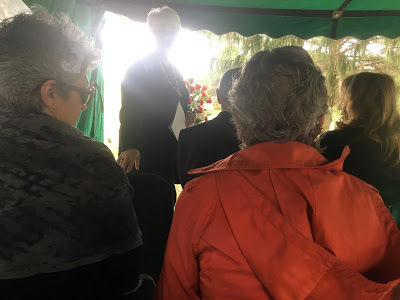
Published on October 07, 2018 03:50
September 19, 2018
Still Digging After All These Years
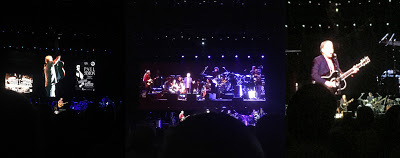
On Friday (September 14), I was gathered with a whole lot of DC-area folks at the downtown arena to hear Paul Simon's "Homeward Bound" farewell tour. He was great. The opening reworking of "Fifty Ways to Leave Your Lover" had a haphazard rhythm that had me a little worried, but it turned out to just be a huge spread of musicians--including a self-contained chamber group, yMusic --getting used to the stage and to each other. Their collaboration on a reworking of "Rene and Georgette Magritte With Their Dog After the War," which is on the new In the Blue Light album, was a highlight, as was all the Graceland material. Simon's vocals were by turns jaunty and weightless. We were on the floor, and it took real effort to train my eyes on the actual person versus the projected scene (compare the concert pic tableau on the left, above, to the detail of the actual Paul Simon below).
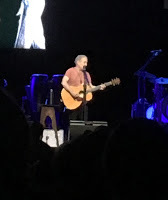 In high school, I listened to "American Tune" over and over again--hitting the rewind button on my Walkman--but I never expected to hear Paul Simon sing it live. When he began, "Many's the time I've been mistaken, / and many times confused..." we had already been on our feet for the encore, and with eyes closed I didn't realize everyone around us had sat down. My husband had to tug on the back of my shirt. I'd be tempted to use a line from that song as an epigraph--for this very poetry collection in hand--but Stephen King got there first; he quotes "American Tune" at a section break in The Stand.
In high school, I listened to "American Tune" over and over again--hitting the rewind button on my Walkman--but I never expected to hear Paul Simon sing it live. When he began, "Many's the time I've been mistaken, / and many times confused..." we had already been on our feet for the encore, and with eyes closed I didn't realize everyone around us had sat down. My husband had to tug on the back of my shirt. I'd be tempted to use a line from that song as an epigraph--for this very poetry collection in hand--but Stephen King got there first; he quotes "American Tune" at a section break in The Stand. 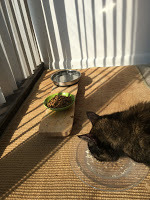 All of which is to say that a month has passed since the last post. I'm weaning myself off daily listenings to the Hamilton soundtrack (which we saw on August 9; this was a good summer for tickets). I've left VCCA to return to our sweet little two-bedroom and the kitty, who is scowling at me lovingly as I type this. Whisky has discovered the glories of shredded chicken, and now expects to be fed a packet of it each morning and evening, which is going turn into an expensive habit. But given that only a couple of years ago I was agonizing over the very real possibility that she'd starve to death, I'll take it.
All of which is to say that a month has passed since the last post. I'm weaning myself off daily listenings to the Hamilton soundtrack (which we saw on August 9; this was a good summer for tickets). I've left VCCA to return to our sweet little two-bedroom and the kitty, who is scowling at me lovingly as I type this. Whisky has discovered the glories of shredded chicken, and now expects to be fed a packet of it each morning and evening, which is going turn into an expensive habit. But given that only a couple of years ago I was agonizing over the very real possibility that she'd starve to death, I'll take it. Looming, humid skies and Flo-influenced rain have mostly kept the lid on any dramatic transition to autumn. But I'm working with U of Tampa MFA students on their thesis projects, and I've introduced American University undergrads to the first two of the six authors they'll get to meet this fall. Tonight we'll talk about Fatimah Ashgar's work in tandem with her visit to AU . So I suppose it's officially back-to-school time. I bought new pens (Pilot G2, .38 "fine" point). I changed out umbrellas.
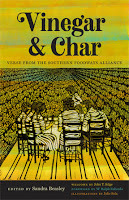 I'll miss out on going back to high school, though; my 20-year reunion for TJHSST is in October, but I'll be down in Oxford, Mississippi to launch Vinegar and Char: Verse from the Southern Foodways Alliance. That's a fair trade--
the symposium is chock-full of amazing programming
, and I'm so excited for this book to come into the world--but I'm sorry to miss seeing folks. Two decades out is when you kind of forget whatever boundary lines existed before. You're just happy to see anyone and everyone in their current incarnations.
I'll miss out on going back to high school, though; my 20-year reunion for TJHSST is in October, but I'll be down in Oxford, Mississippi to launch Vinegar and Char: Verse from the Southern Foodways Alliance. That's a fair trade--
the symposium is chock-full of amazing programming
, and I'm so excited for this book to come into the world--but I'm sorry to miss seeing folks. Two decades out is when you kind of forget whatever boundary lines existed before. You're just happy to see anyone and everyone in their current incarnations. Early this morning, I was thinking about how the utility of blogging has changed a little bit since we first began this process. If I want to tell you about my upcoming reading with Emily Jungmin Yoon and Lindsay Bernal (this Saturday! East City Book Shop, 9/22, 5 PM) or share my excitement about receiving a 2018 "Best of the Net" nomination from Split This Rock for "Customer Service Is," I'll probably use other forms of social media to do so. If I want to blunder my way through a draft of a poem or essay, I'll keep it offline to preserve the publishing options. So this space becomes a space for...what, exactly? But this blog can host thoughts that fill larger spaces than 200-odd characters or a link + hashtag, for sure. Maybe open-ended grist for discussion, like Iggy Pop (circa 1980) telling Tom Snyder about the difference between "Dionysian" and "Apollonian" art. I got to this snippet via thinking about Paul Simon--who a commenter argued was of the "Apollonian" school. I suspect I am too, though I'd like to think I'm capable of raising a little hell on stage now and again.
Published on September 19, 2018 07:59



